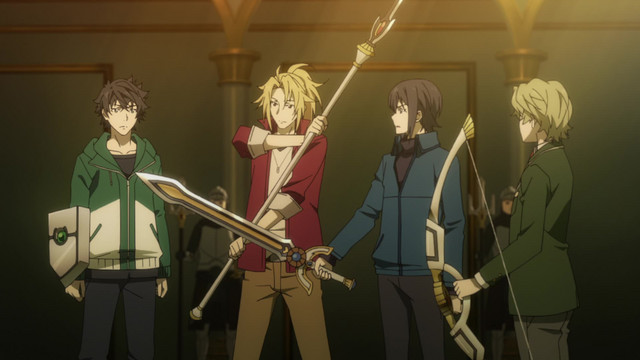
In recent times, thanks to the #MeToo movement started by victims of Harvey Weinstein and other slimy big wig Hollywood producers, it is bringing more attention to sexual harassment and assault to heightened levels of awareness. Nobody can disagree that’s a bad thing, and we encourage people who have been victim of an assault, or know somebody who has been, to report it to the appropriate authorities (or just shoot the guy). We hope that all victims can find justice.
On the other hand, there have been stories of false accusations such as with football prospect, Brian Banks, who was imprisoned for six years, and as a result, lost his opportunity at a scholarship and a promising NFL career. Sexual assault and harassment are horrible, and should be prosecuted to the fullest extent of the law. While we’re not here to debate whether false accusations should be held to the same standard, they do have their consequences as the actual crime of sexual assault, and that leads us to Naofumi’s story in Tate no Yuusha no Nariagari
Should We Believe?/Innocent Until Proven Guilty
The premiere of Tate no Yuusha no Nariagari comes just months after the fiasco of Justice Brett Kavanauagh, who was accused of allegedly sexually assaulting Dr. Christine Ford when they were teenagers, and this sparked the #BelieveSurvivors movement. We’re not here to say who is right or wrong on this, or endorse any political party or ideology, but when you watch this series just after this case (if you’ve been following it), a handful of viewers (probably) can’t help but find a correlation between them. We can’t say who’s right or wrong, but as those of you familiar with the situation know, who to believe was split amongst party lines. Democrats were quick to believe Dr. Ford, while Republicans were quick to believe Justice Kavanaugh, and if Dr. Ford was assaulted, she should have contacted authorities right away and they said there was no evidence to collaborate her claims.
As we see with Naofumi, his hopes of becoming a hero are ruined when Malty, a princess, falsely accuses him of sexually assaulting her. And everybody is quick to believe her, especially with false evidence planted against him. He has no chance to explain his case and he’s essentially exiled from the hero team. Of course, this is taking place in an isekai, and the laws of the United States, Japan, or the real world as a whole don’t apply here for the sake of plot. On the other hand, while we are encouraged to believe survivors and victims, we see how such conclusive mentalities can violate the accused’s right to due process, being innocent until proven guilty, and we see how this negatively affects Naofumi.
It Violates Due Process
For Naofumi, he was set up to be a victim to begin with. He was assigned to be the Shield Hero, or the Tate no Yuusha, which has negative connotations with the world he’s sucked into. When we go back to Brian Banks, under the bad advice of his attorney who thought would get probation if he pleaded guilty, he ended up serving six years in prison. For Naofumi, he’s in no position to have any representation at all, and he’s outnumbered by a majority who not only hate him because he’s the Shield Hero but because the accuser is the princess. If the princess says it, it must be true, and it shows that there’s a clear discrimination with class. As for Banks, some people would argue race played a part as to why took the plea bargain.
Of course, this goes back to believing survivors. Again, we’re not here to say that all victims are false accusers, this just means that for anyone accused, as much as how there are NUMEROUS guilty parties, due process must be served. Yes, Brock Turner, who is as conclusively guilty as OJ, got off easy, and such rulings largely contribute to why victims don’t want to report their situations. In the end, real life and anime demonstrate there needs to be a reform as to how the system deals with real sexual assault, and false accusations. In the case of Brian Banks’ accuser, she is not facing any legal penalties (however, she has been ruled that she must pay in damages). As to Naofumi getting retribution, you have to see the anime to find out.
Final Thoughts

Sexual assault can ruin people’s lives, and there’s no disputing that. In the case of Brock Turner, for all we know and care, he should have gotten the chair. The victim, legally referred to as Emily Doe, certainly deserves justice and the judge should be removed from the bench and disbarred from practicing law. Yes, people dispute that race and class played a part in it, but on the same token, people from all backgrounds equally condemned the sentencing and sexual assault as a whole.
On the other hand, falsely accusing people, and the accused facing the consequences as if they did it, is also just as low and ruining. Granted Naofumi does not get thrown in the dungeon and got off relatively easy in comparison to Brian Banks, it did change him in a negative way that audiences can understand. He becomes distrusting and full of hate and rage on not just the false accusations, but how people treated him afterwards. You see that when it’s time for people to rely on him, he expects something in return whether it would be money, food, board, or medicine because that way, he has some sort of collateral or incentive to do something and then not have it thrown back at him. Having some sort of compensation is how way of dealing with his trust issues. Of course they may not apply to real life, but such instances can change a person’s psyche.


